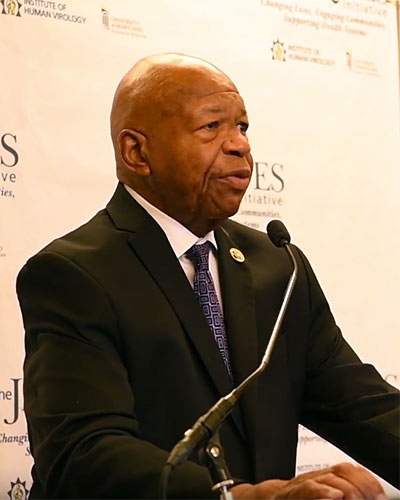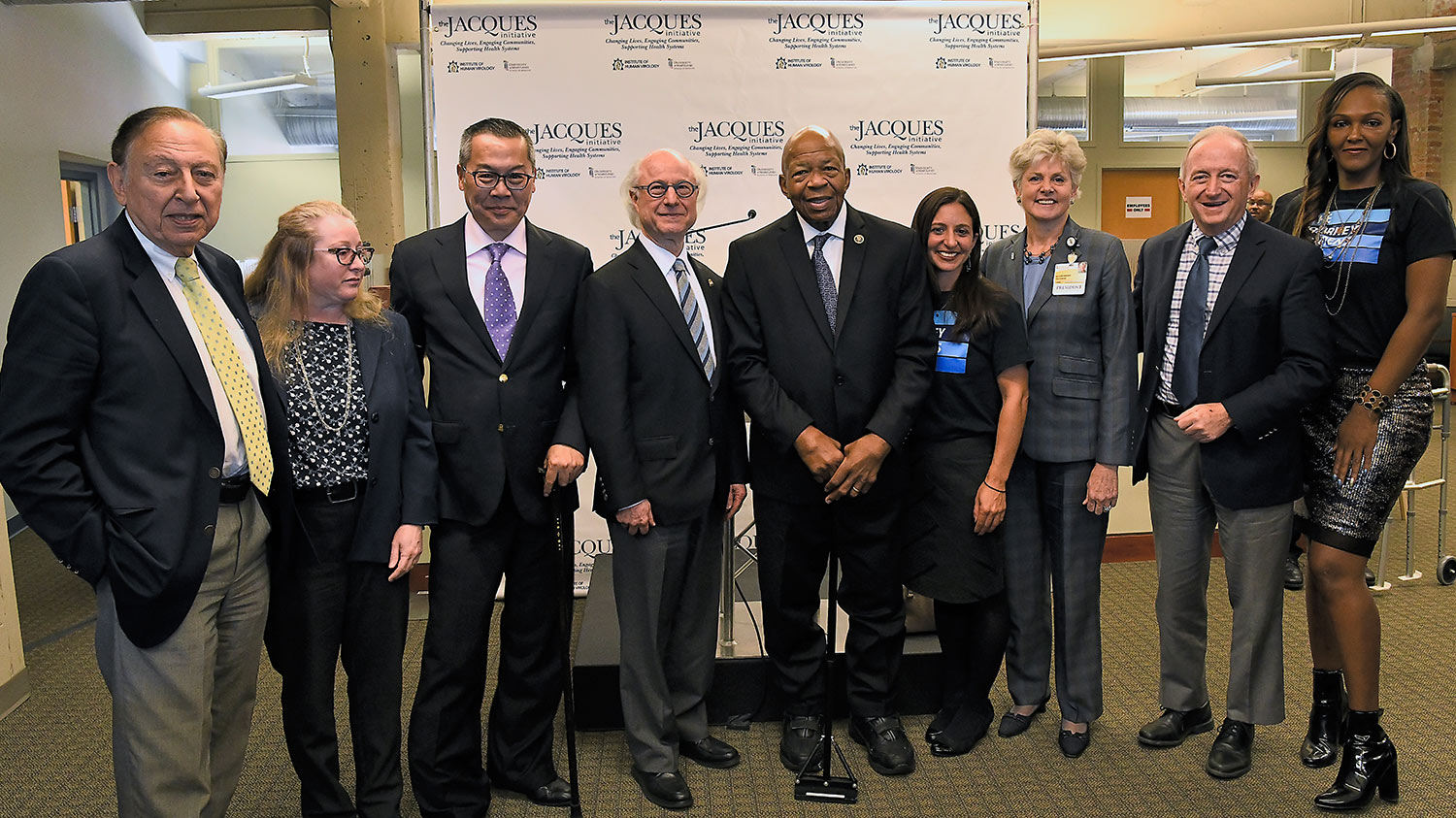October 18, 2018 | Nora Samaranayake

U.S. Representative Elijah Cummings (D-MD) and other top officials highlighted the Importance of supporting the Baltimore community at the Grand Opening of the JACQUES Initiative Journey Center. The center is part of the JACQUES Initiative, a program of the Institute of Human Virology (IHV) at the University of Maryland School of Medicine (UMSOM).
The new 7,300 square foot headquarters of the JACQUES Initiative Journey Center is located at 880 Park Avenue in Baltimore. The Center offers a wide range of free services to the Baltimore community, including walk-in HIV and Hepatitis-C testing; peer support and navigation to HIV and Hepatitis-C prevention services, health education, support groups, LGBTQ+ community events, youth-friendly programming, computer and financial literacy courses, and community work space.
Officials speaking at the grand opening included The Honorable Elijah Cummings, U.S. House of Representatives; Jamie Mignano, PhD, MSN, MPN, RN, Executive Director, The JACQUES Initiative, Bruce Jarrell, MD, FACS, Executive Vice President, Provost and Dean of the Graduate School, University of Maryland, Baltimore; Alison Brown, MPH, President of the University of Maryland Medical Center Midtown Campus, and Senior Vice President, University of Maryland Medical System; Curt Civin, MD, Associate Dean for Research, Director, Center for Stem Cell Biology & Regenerative Medicine at UMSOM; Robert Gallo, MD, the Homer and Martha Gudelsky Distinguished Professor in Medicine and Director of the IHV; Mary Beth Haller, Esq, Interim Baltimore City Health Commissioner; and Rhonda Carr, IHV JACQUES Initiative Journey Center Peer Navigator.

Download Journey Center Information PDF
Download JACQUES Initiative Organizational Capacity Statement PDF
Download Treatment Adherence Center Information PDF
Download Linkage to Care Center Information PDF
Watch this WBALTV News Story about the Grand Opening
About the JACQUES Initiative
The JACQUES Initiative, which is a program of the Institute of Human Virology at the University of Maryland School of Medicine and was established in 2003, is named for Joe Jacques, a psychologist who helped establish the first HIV support group for Baltimore’s most vulnerable persons living with HIV. The program’s mission is to change lives, engage communities, and support health systems affected by HIV and Hepatitis C virus (HCV).
About the Institute of Human Virology
Formed in 1996 as a partnership between the State of Maryland, the City of Baltimore, the University System of Maryland and the University of Maryland Medical System, IHV is an institute of the University of Maryland School of Medicine and is home to some of the most globally-recognized and world-renowned experts in all of virology. The IHV combines the disciplines of basic research, epidemiology and clinical research in a concerted effort to speed the discovery of diagnostics and therapeutics for a wide variety of chronic and deadly viral and immune disorders - most notably, HIV the virus that causes AIDS. For more information, www.ihv.org and follow us on Twitter @IHVmaryland.
About the University of Maryland School of Medicine
Now in its third century, the University of Maryland School of Medicine was chartered in 1807 as the first public medical school in the United States. It continues today as one of the fastest growing, top-tier biomedical research enterprises in the world -- with 43 academic departments, centers, institutes, and programs; and a faculty of more than 3,000 physicians, scientists, and allied health professionals, including members of the National Academy of Medicine and the National Academy of Sciences, and a distinguished recipient of the Albert E. Lasker Award in Medical Research. With an operating budget of more than $1 billion, the School of Medicine works closely in partnership with the University of Maryland Medical Center and Medical System to provide research-intensive, academic and clinically-based care for more than 1.2 million patients each year. The School has over 2,500 students, residents, and fellows, and more than $530 million in extramural funding, with most of its academic departments highly ranked among all medical schools in the nation in research funding. As one of the seven professional schools that make up the University of Maryland, Baltimore campus, the School of Medicine has a total workforce of nearly 7,000 individuals. The combined School and Medical System (“University of Maryland Medicine”) has an annual budget of nearly $6 billion and an economic impact more than $15 billion on the state and local community. The School of Medicine faculty, which ranks as the 8th highest among public medical schools in research productivity, is an innovator in translational medicine, with 600 active patents and 24 start-up companies. The School works locally, nationally, and globally, with research and treatment facilities in 36 countries around the world. Visit medschool.umaryland.edu/
Contact
Institute of Human Virology
Jennifer Gonzales
Public Relations & Communications Manager
jennifer.gonzales@ihv.umaryland.edu
Related stories

Friday, October 18, 2019
UMSOM Mourns "Passionate Advocate" Rep. Elijah Cummings
The University of Maryland School of Medicine (UMSOM) mourns the loss of Rep. Elijah Cummings from Maryland’s 7th District.
